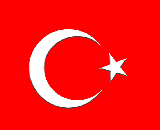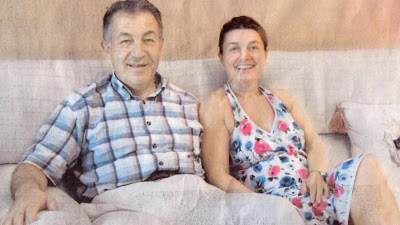We are 100% Turks and Christians
21 Δεκεμβρίου 2012
Ahmet and Dezla Ozgiunes, who have become Orthodox Christian in the last couple of years, speak to Alexandros Massavetas of ‘Kathimerini’ newspaper.
We kept meeting every year in one of the Greek parishes at Nichori of Vosporos during the Easter Service as if we had been keeping an appointment. I thought they were just like the many other Turks who come to the Service out of curiosity to experience the Greek traditional Easter or to celebrate among Christian friends and be part of a multinational and mixed religious congregation.
 The couple, elegant, educated and well travelled, is among the thousands of Turks who have recently decided to change their religion and among the very few who do not keep their decision secret. They have decided to share with the readers of ‘Kathimerini’ their internal quest which led them to espouse Orthodoxy, as well as to explain to us what it means to be a Turk and a Christian. The interview took place a few months before they were due to emigrate abroad.
The couple, elegant, educated and well travelled, is among the thousands of Turks who have recently decided to change their religion and among the very few who do not keep their decision secret. They have decided to share with the readers of ‘Kathimerini’ their internal quest which led them to espouse Orthodoxy, as well as to explain to us what it means to be a Turk and a Christian. The interview took place a few months before they were due to emigrate abroad.
Several articles in the newspapers on the recent baptisms of Muslims insisted that these involved Turks who were of Greek or Armenian origin and thus they were just ‘returning to their roots’. Was such an origin the reason which led you to espouse Christianity?
(Ahmet) Indeed some people did return to their origins by becoming Christians, but this did not apply to us. I was born in Cappadocia and my ancestors hailed from Caucasus. As far as I know there were no Christians in our family. I acceded to Orthodoxy out of personal interest.
(Dezla) My mother hails from Kavala and my father from Pontos. Some relatives do speak romeika -the local Greek dialect spoken by those who had been Islamized. Nevertheless, abandoning Islam and espousing Orthodoxy was a personal choice and had nothing to do with my origins.
The Turkish identity has historically been so closely connected to Islam that many Turks cannot accept that a Turk may not be a Muslim. How do you feel about this?
(A) It is true that many people do not view one as a ‘Turk” if he belongs to a different religion, especially if one is a Christian or a Jew. They believe that such a person does not just have a different religion but belongs to a different nation.
(D) This perception is mainly due to historical reasons. It is an ottoman tradition to divide people into different nationalities because of their religion. For example all orthodox people belonged to the Orthodox nation and the ottoman administration did not distinguish them as Bulgarians, Serbs or Greeks because of their identity. In Cappadocia, the inhabitants were distinguished between Romioi and Turks because of their religion. The Orthodox people at my home region, Talas, were native Turkish speakers and they even held their church services in Turkish. Their Orthodox religion was the element which distinguished them as ‘Romioi’. Turkish history gives other different examples. Throughout history, Turkish tribes espoused Christianity throughout the Turkish regions. There are Turkish Christians in Central Asia, in Romania and thousands of Turks in Turkey have espoused Christianity. Nevertheless, being Christian does not exclude them from being Turks. I am also a Christian and 100% Turk, while my native language is Turkish. Besides, to distinguish nations on religious grounds is outdated. People are usually baffled by the fact that a Turk could also be a Christian, but this is slowly changing.
What’s your profession?
(D) I’m a dietician and also do volunteer work.
(A) I was a director at various governmental organizations and have lived in the US for some years. Later on I did business in Belgium.
Ahmet, does your decision to espouse Christianity date back to the times you have lived in Christian countries?
No, the ground was laid long before that. Unfortunately, Christianity is presented as something which comes to Turkey from abroad. This is a mistake since Christianity is an important part of the history of the region. This is verified by the privileges that Mohammed the Conqueror gave to the Patriarchate. We see Christianity through the lens of Islam even as children. Many Muslims feel great reverence for Christians, since the Koran insists on this, as it sees Jesus as a prophet. Muslims also hold The Most Holy Lady to a great esteem. You have certainly seen the masses of Muslims gathering at various Christian churches in Constantinople worshiping the Saints and asking for their assistance or their mediation. In Turkey, we have been preparing from an early age to receive the Christian ideas. The various problems which arise are due to the education that both sides receive as well as to ignorance. For example many Muslims are not able to comprehend the idea of the Triune God and think that Christianity is a polytheistic religion because it worships three Gods. I am not being critical here. I am just mentioning this as an indication of how misinformation works. It is not right to criticize Islam, a religion which I have abandoned.
What about your quest Dezla. Has it also begun in Turkey?
Yes, it all started at University. My family was more or less religious, without adhering to everything that Islam demanded. They identified themselves as Muslims and so did I until I started studying in Ankara. Our parents had allowed us reasonable freedom on the matter of religion. When I abandoned Islam, I felt a vacuum which I had to fill. I started reading. I was doing my own research. This is how my own journey began which led me to Orthodoxy.
Therefore, your course towards Orthodoxy was the result of ‘local’ experiences, without external influences…
(A) Any influence that I might have had from the States and Europe could have only been negative. I could not feel at ease with the Christians there. They repelled me because they have turned Christianity into psychotherapy. They go to Church on Sunday to relax, whereas religion aims to fill a vacuum. In Europe Christianity has been turned into a festival away from any religious references. Let’s take Christmas. Many people do not wish one another ‘Merry Christmas’ but ‘happy holidays’. In Europe, people harbor a very superficial relationship with Christianity. They have no idea about its message neither its spirituality.
How do Christians here differ from their European counterparts?
(D) We are much nearer to the essence and tradition of Christianity.
(A) We are much more faithful.
(D) At least we adhere to the commands of our religion. We go to Church every Sunday and read the Scriptures together every night for some time. And we pray.
Do you have any connection with the Greek community here?
(A) We are closely connected since we meet every Sunday at Church. The Greek community has some very nice people and we have become friends. Each one has something to give us. The Services are held alternatively at some church. We often visit the churches at Nichori. Lakis Vingas, who is the president of the community, asks Dezla to read ‘Our Father who art in Heaven’ in Turkish.
(D) Indeed, I read it for the Turkish speaking congregation (Laughs).
You must find it difficult when the liturgy is all in Greek.
(A) We prepare ourselves for each service at home so that we can follow it when we are there. We have a bilingual version of the Scriptures so that we can follow the Turkish text. It is significant for someone to be able to understand, to participate…
Fr Euthym’s abdication from the Patriarchate and the creation of the ‘Turkish Orthodox Church’ in 1920 was a traumatic experience. Perhaps it still complicates the acceptability of the Turkish language in the Greek parishes of Constantinople, something already accomplished by other dogmas…
(A) Yes, of course… I hope that in time there will be a liturgical service in Turkish in the Orthodox Church. Today only the Creed of Faith is being read in Turkish. The issue with Fr Euthym must also be settled. It is not right that churches hold a grudge with each other… All Orthodox ought to come under the Ecumenical Patriarchate.
Did you ever experience any negative reactions from your social circle because of the change of religion? Are you concerned about it at all?
(A) I didn’t meet with any negative reaction; neither do I have any concern.
(D) I didn’t have any adverse reaction. My family was surprised but accepted my choice.
Do you think that other Turks will follow your example and espouse Christianity?
(A and D) Yes, many will do.
Few have been baptized to date…
It is true that those who have been baptized are more numerous than those who admit it. They are scared of the reaction from their social circle. They are crypto-Christians.
(A) Yes, there is some fear. But this must change. Society must also change its stance against those who change their religion. Needless to say the Orthodox Church here does not proselytize people. On the contrary, it puts those who want to change through their paces. One must go through a long catechesis and one’s honest intention is tested.
Was it therefore difficult to be admitted into the ranks of the Orthodox Church?
(A) It took a long time, but it was something we really wanted.
Do you believe that the government’s recognition of the ecumenical character of the Patriarchate would benefit Turkey?
(A) Of course. In my opinion the Patriarchate is an institution through which the Turks and the Orthodox could come together and this will be crucial for Turkey. Since Turkey wants to become a member of the EE, the Patriarchate could assist in bringing the country nearer to Europe and this role is very significant. Moreover, the Orthodox Church plays the most suitable role in the dialogue between different religions since its congregation has coexisted with the Muslims for centuries. I cannot say that such coexistence was always friendly or peaceful but it has at least created ways of communication. I cannot understand why some people in my country would like to downgrade the Ecumenical Patriarchate. I am both surprised and saddened. This recognition is more crucial for Turkey than it is for example for Greece or Russia. If our government had actively promoted the role of the Patriarchate as the centre of Orthodoxy, Turkey’s spiritual role would have been promoted worldwide. Some nationalist circles in Greece do not wish to have the Patriarchate’s role advanced because it is situated in Turkey. Russia, for its part, wishes Moscow to be recognized as the centre of Orthodoxy rather than the Patriarchate. Unfortunately many people undermine the Patriarchate.
Have you been alarmed by the attacks against Christians like the murder of Fr Santorio in Trapezounta and the massacre of Christians in Malatia? Who do you think was behind these atrocities?
(A) I don’t think that similar events could take place here in Constantinople. In view of the negotiations with the EE, Turkey is changing dramatically. Turks become more tolerant and open. It is normal that some extremists would object to such changes. Such paranoid resistance to progress is found everywhere amongst extremists circles. These are dark forces which have nothing to do with the state. They are outcasts.
Source: http://www.oodegr.com/oode/ierapostoli/xwres/tourkia/tourkoi_xristianoi_1.htm– http://agathan.wordpress.com
Translated in English by Olga Konaris Kokkinos, Journalist,(BA, MA)



